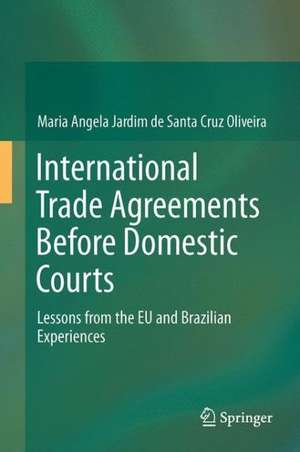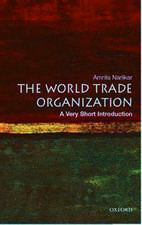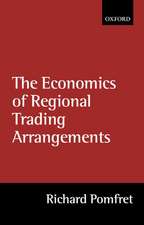International Trade Agreements Before Domestic Courts: Lessons from the EU and Brazilian Experiences
Autor Maria Angela Jardim de Santa Cruz Oliveiraen Limba Engleză Hardback – 19 mar 2015
| Toate formatele și edițiile | Preț | Express |
|---|---|---|
| Paperback (1) | 383.93 lei 6-8 săpt. | |
| Springer International Publishing – 9 oct 2016 | 383.93 lei 6-8 săpt. | |
| Hardback (1) | 391.22 lei 6-8 săpt. | |
| Springer International Publishing – 19 mar 2015 | 391.22 lei 6-8 săpt. |
Preț: 391.22 lei
Nou
Puncte Express: 587
Preț estimativ în valută:
74.88€ • 81.37$ • 62.94£
74.88€ • 81.37$ • 62.94£
Carte tipărită la comandă
Livrare economică 21 aprilie-05 mai
Preluare comenzi: 021 569.72.76
Specificații
ISBN-13: 9783319139012
ISBN-10: 3319139010
Pagini: 250
Ilustrații: XI, 209 p.
Dimensiuni: 155 x 235 x 17 mm
Greutate: 0.49 kg
Ediția:2015
Editura: Springer International Publishing
Colecția Springer
Locul publicării:Cham, Switzerland
ISBN-10: 3319139010
Pagini: 250
Ilustrații: XI, 209 p.
Dimensiuni: 155 x 235 x 17 mm
Greutate: 0.49 kg
Ediția:2015
Editura: Springer International Publishing
Colecția Springer
Locul publicării:Cham, Switzerland
Public țintă
ResearchCuprins
1. Introduction.- 2. The Relations Between International Law and Domestic Courts.- 3. The Relations Between International Trade Agreements and Domestic Courts in Brazil.- 4. The Relations Between International Trade Agreements and Domestic Courts in the European Union.- 5. Comparing the Role of Domestic Courts in International Trade Agreements.- 6. Conclusion.
Textul de pe ultima copertă
This book addresses the role of domestic courts in the enforcement of international trade agreements by examining the experiences of Brazilian and the European Union courts. This comparative study analyzes the differences, similarities and consequences of Brazilian and European courts’ decisions in relation to the WTO agreements, which have “direct effect” in Latin American emerging economies, but not in the European Union or other developed countries. It observes that domestic courts’ enforcement of international trade agreements has had several unintended and counterproductive consequences, which were foreseeable in light of international scholarly debate on the direct effect of WTO agreements. It draws lessons from these jurisdictions’ experiences and argues that the traditional academic literature that fosters domestic courts’ enforcement of international law should be reconsidered in Latin America in relation to international trade agreements. This book defends the view that, as a result of their function and objectives together with the principles of popular sovereignty and democratic self-government, international trade agreements should not be considered to be self-executing or to have direct effect. This empirical work will be valuable to anyone interested in the effects of international trade rules at the domestic level and the role of domestic judges in international law.
Caracteristici
Presents the Brazilian experience with domestic application of international trade agreements Shows the actual consequences in the real world of adopting or not direct effect of WTO law Provides pathways for further research in other Latin American countries















